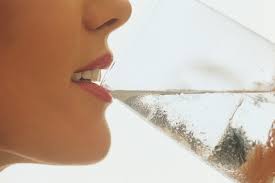For the first time, the mechanism that regulates fluid intake in the human body and stops us from over-drinking has been revealed by researchers. Over-drinking can cause potentially fatal water intoxication. The study challenges the popular idea that we should drink eight glasses of water a day for health.
The study showed that a 'swallowing inhibition' is activated by the brain after excess liquid is consumed, helping maintain tightly calibrated volumes of water in the body.
Associate Professor Michael Farrell from the Monash Biomedicine Discovery Institute oversaw the work by University of Melbourne PhD student Pascal Saker as part of a collaboration with several Melbourne institutes.
"If we just do what our body demands us to we'll probably get it right - just drink according to thirst rather than an elaborate schedule," Associate Professor Farrell said.
Building on a previous study, the researchers asked participants to rate the amount of effort required to swallow water under two conditions; following exercise when they were thirsty and later after they were persuaded to drink an excess amount of water.
The results showed a three-fold increase in effort after over-drinking.
"Here for the first time we found effort-full swallowing after drinking excess water which meant they were having to overcome some sort of resistance," Associate Professor Farrell said.
"This was compatible with our notion that the swallowing reflex becomes inhibited once enough water has been drunk."
Associate Professor Farrell, who works in the Monash University Department of Medical Imaging and Radiation Sciences, used functional magnetic resonance imaging (fMRI) to measure activity in various parts of the brain, focusing on the brief period just before swallowing.
The fMRI showed the right prefrontal areas of the brain were much more active when participants were trying to swallow with much effort, suggesting the frontal cortex steps in to override the swallowing inhibition so drinking could occur according to the researchers' instructions.
"There have been cases when athletes in marathons were told to load up with water and died, in certain circumstances, because they slavishly followed these recommendations and drank far in excess of need," he said.
Drinking too much water in the body puts it in danger of water intoxication or hypothermia, when vital levels of sodium in the blood become abnormally low potentially causing symptoms ranging from lethargy and nausea to convulsions and coma.
Associate Professor Farrell said elderly people, however, often didn't drink enough and should watch their intake of fluids.
The study, 'Over drinking results in the emergence of swallowing inhibition: an fMRI study,' is published online in the Proceedings of the National Academy of Sciences. It was carried out in collaboration with the Florey Institute of Neuroscience and Mental Health, University of Melbourne and Baker IDI & Diabetes Heart Institute.
Water: How much should you drink every day?
Water is essential to good health, yet needs vary by individual.
It's a simple question with no easy answers. Studies have produced varying recommendations over the years, but in truth, your water needs depend on many factors, including your health, how active you are and where you live.
Although no single formula fits everyone, knowing more about your body's need for fluids will help you estimate how much water to drink each day.
Health benefits of water
Multimedia
Water is your body's principal chemical component and makes up about 60 percent of your body weight. Every system in your body depends on water. For example, water flushes toxins out of vital organs, carries nutrients to your cells, and provides a moist environment for ear, nose and throat tissues.
 Lack of water can lead to dehydration, a condition that occurs when you don't have enough water in your body to carry out normal functions. Even mild dehydration can drain your energy and make you tired.
Lack of water can lead to dehydration, a condition that occurs when you don't have enough water in your body to carry out normal functions. Even mild dehydration can drain your energy and make you tired.What about the advice to drink 8 glasses a day?
Everyone has heard the advice, "Drink eight 8-ounce glasses of water a day." That's about 1.9 liters, which isn't that different from the Institute of Medicine recommendations. Although the "8 by 8" rule isn't supported by hard evidence, it remains popular because it's easy to remember. Just keep in mind that the rule should be reframed as: "Drink eight 8-ounce glasses of fluid a day," because all fluids count toward the daily total.














0 comments:
Post a Comment